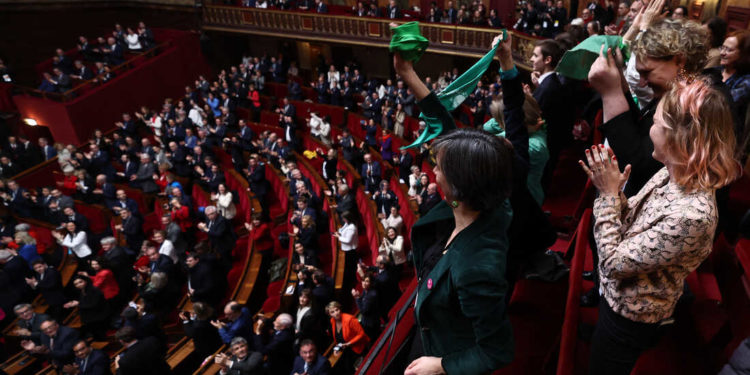France has become the first country in the world to embed abortion rights into its constitution, a groundbreaking decision in response to growing threats against reproductive rights globally. The decision, made on Monday, was met with resounding support from lawmakers, culminating in a significant legislative victory for advocates of women’s rights.
The amendment, passed with an overwhelming majority of 780 to 72 votes across both houses of the French Parliament, solidifies the “guaranteed freedom” to abortion in France. This measure, while hailed as historic, fell short of some groups’ desires for more explicit language defining abortion as an unequivocal “right.”
The timing of this landmark decision is significant, notably following the US Supreme Court’s controversial ruling to overturn Roe v. Wade, a decision that has placed reproductive rights under threat not only in the United States but also in other parts of the world. With far-right movements gaining traction in Europe, concerns over the erosion of reproductive rights have become increasingly pronounced.
The symbolic importance of this decision was underscored by Prime Minister Gabriel Attal, who emphasized France’s debt to women who had previously suffered through illegal abortions. Attal affirmed, “Above all, we’re sending a message to all women: your body belongs to you.”
French President Emmanuel Macron announced plans for a formal celebration of the amendment’s passage on Friday, coinciding with International Women’s Rights Day, reinforcing the significance of this decision in the global fight for gender equality.
The roots of this victory can be traced back to France’s legalization of abortion in 1975, championed by then-Health Minister Simone Veil, a Holocaust survivor and prominent feminist figure. Unlike the polarized debates on abortion in the United States, abortion enjoys widespread support across the political spectrum in France.
The passage of this amendment represents a triumph for the French left, which has long advocated for the constitutional guarantee of abortion rights. The urgency of this measure was heightened following the US Supreme Court’s ruling on Roe v. Wade, prompting France to act decisively to safeguard reproductive rights.
However, opposition to the amendment was voiced primarily by the Catholic Church, which reiterated its stance against abortion. The Vatican’s Pontifical Academy for Life issued a statement asserting that there can be no “right” to take human life. Additionally, French bishops reiterated the Church’s opposition to abortion ahead of the vote.










